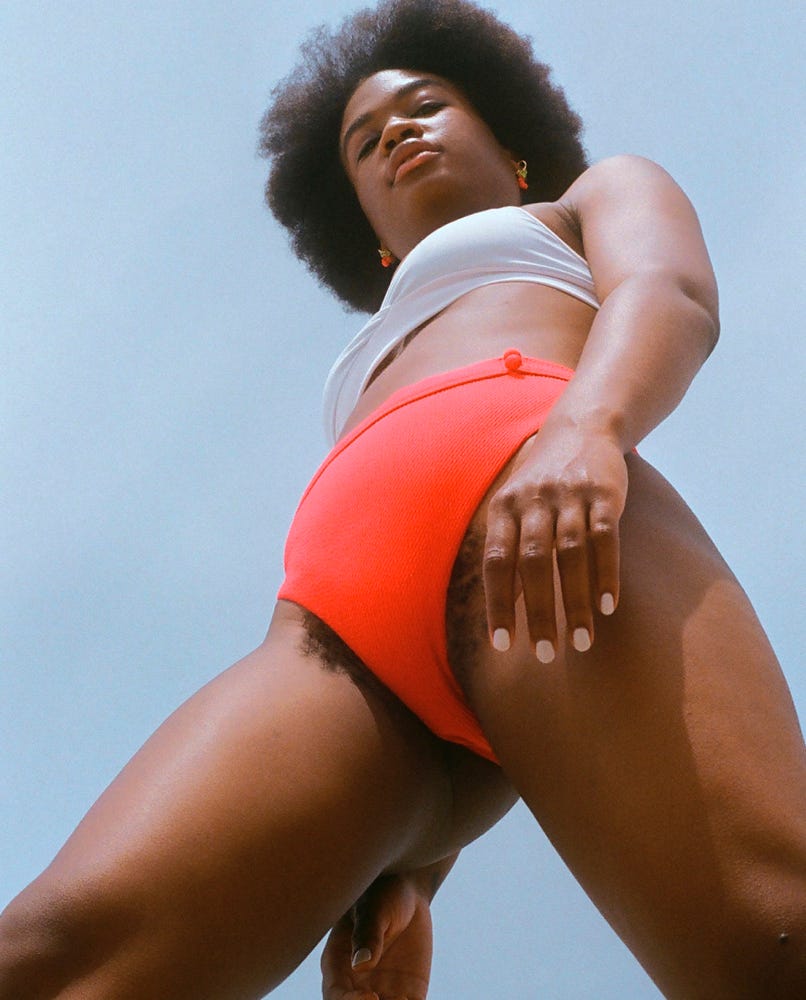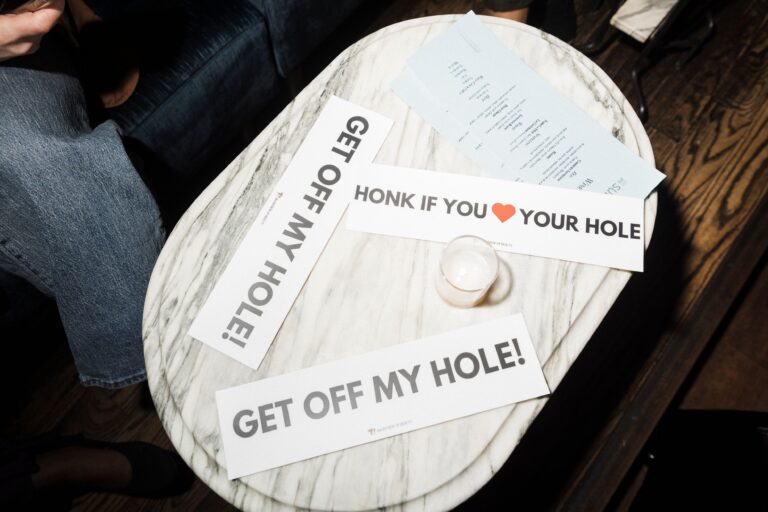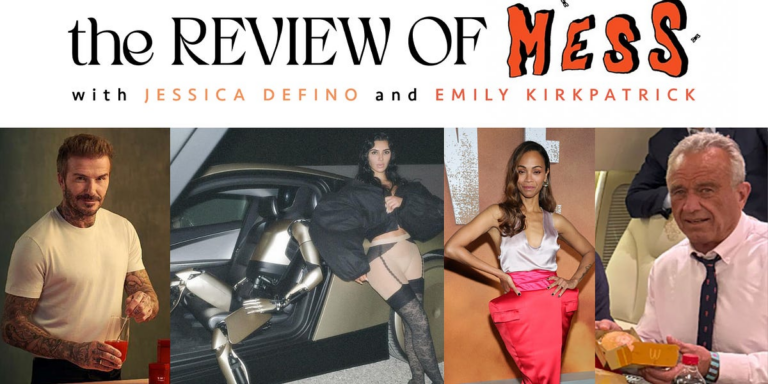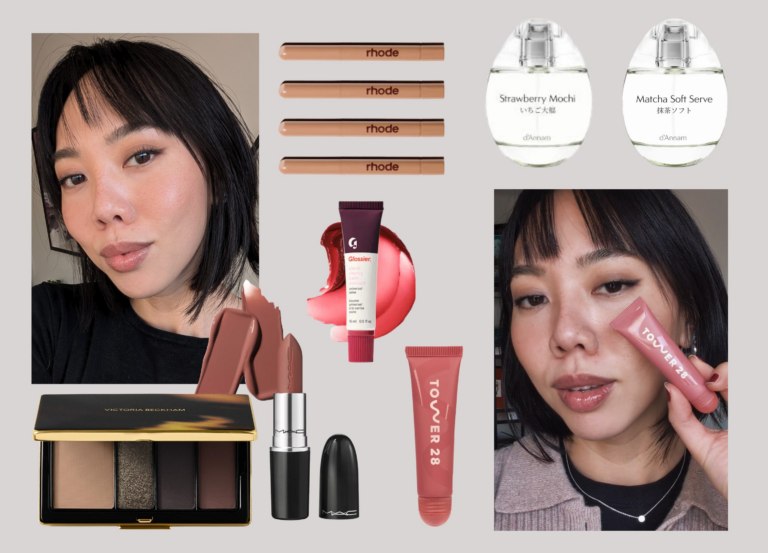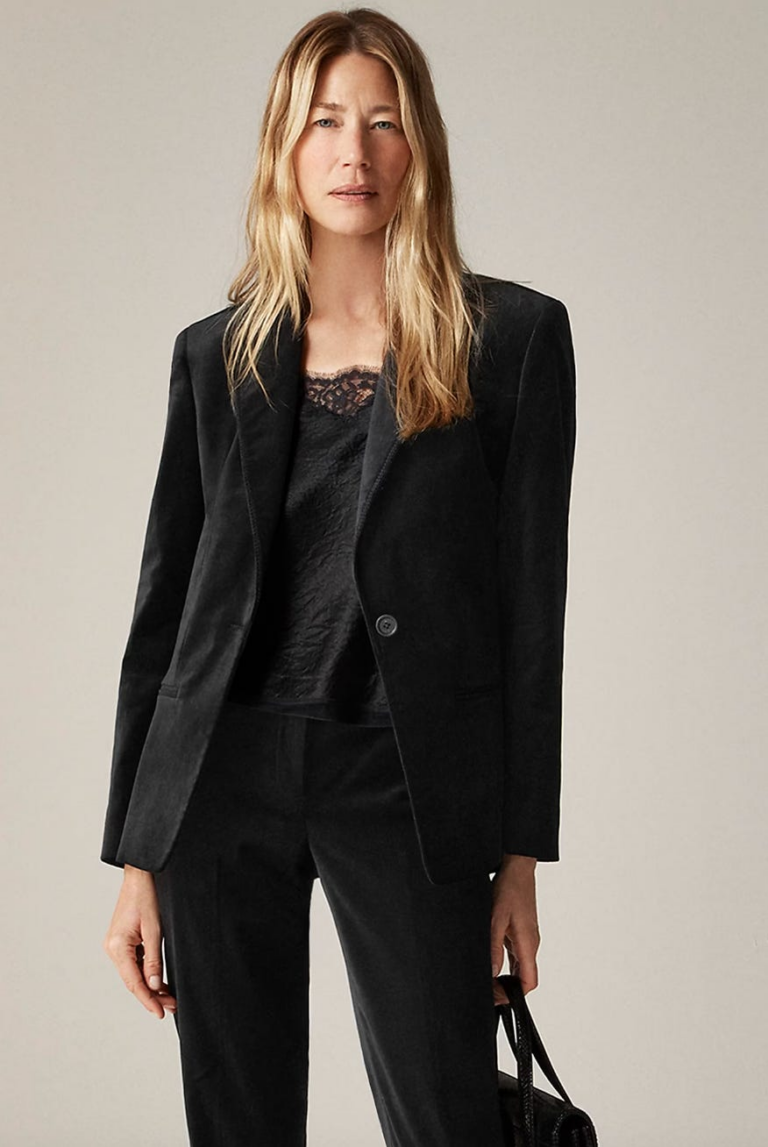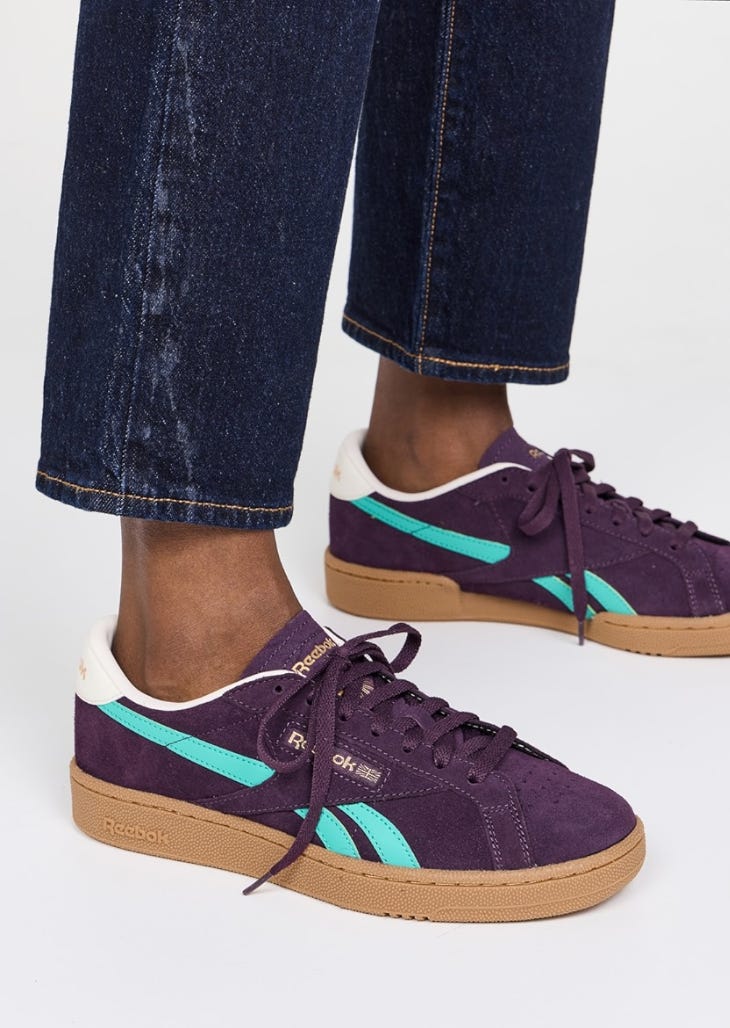Pubes, Eggs, Cherries, & Tariffs
Hello and welcome to another edition of THE DON’T BUY LIST! For those interested in the genre of beauty horror — that’s body horror that comments on beauty culture, in the vein of “Natural Beauty” by Ling Ling Huang or The Substance — I highly recommend The Ugly Stepsister. I caught a press screening the other night, and the film truly has it all: Braces! Nose jobs! Pimple popping! Tape worms! Sew-on eyelashes! An old-school post-op mask that would be right at home in a modern morning shed video! And, of course, copious amounts of corporeal ejecta.
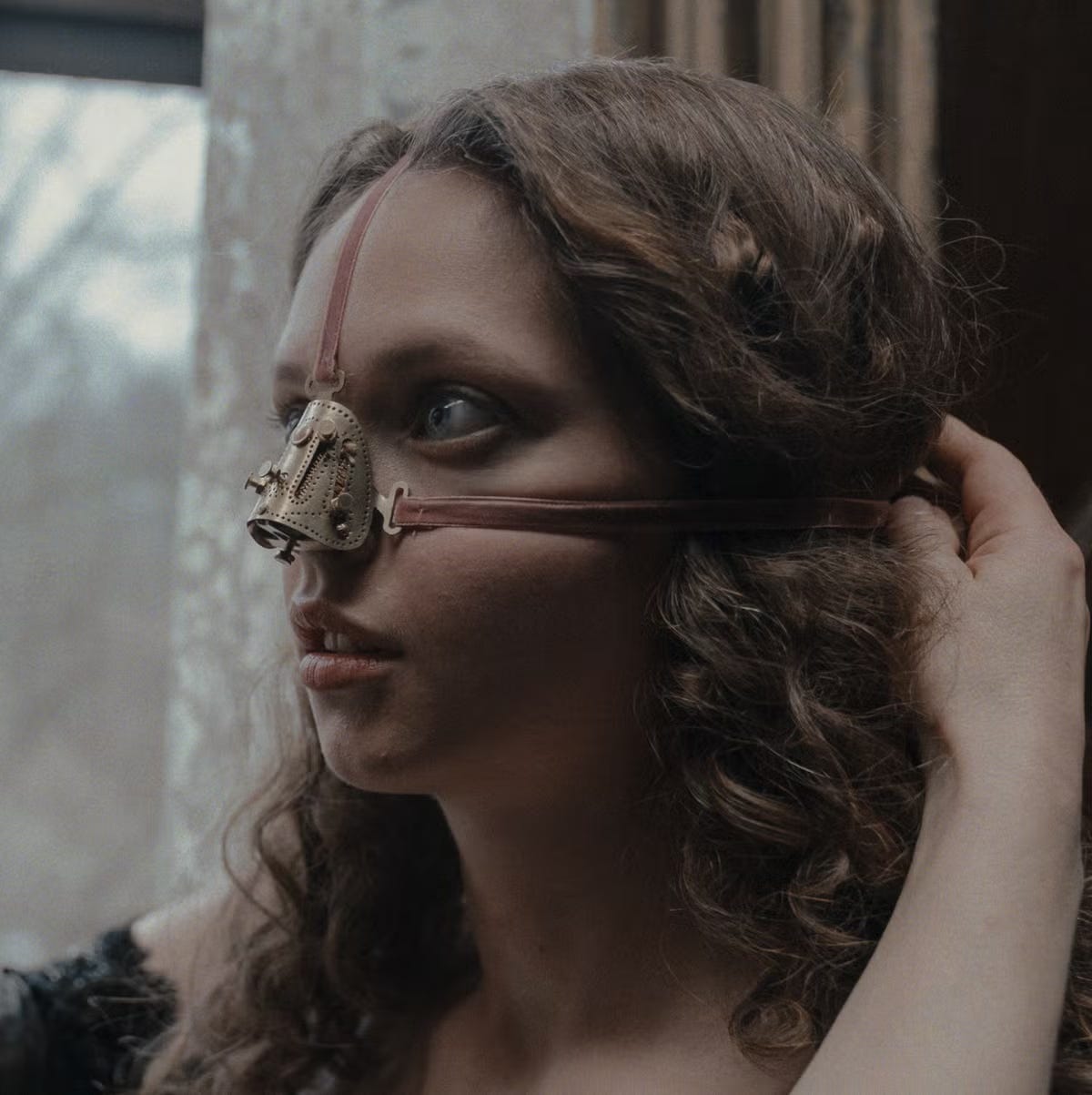
Free issue today! Onto the links.
IN THIS ISSUE: In Bed With The Right! The bush is so over/so back! Objectification through teeth! Cécred at Ulta! Cherries! Asbestos! Tariffs! PFAS! Exosomes! Eggs! & more!
I’m In Bed With The Right this week — or rather, in the cosmetic injector’s office with the right. Check out the latest episode of the IBWTR podcast here, where I cover Mar-a-Lago Face and “Republican makeup” with hosts Moira Donegan and Adrian Daub. We chat through the semiotics of cosmetics, right-wing hyper-femininity as a left-wing taunt, deliberate aesthetic dehumanization as an assertion of God-like power, and (strangely enough) what the history of puppetry can tell us about MAGA.
Listen Here
“The bush is so over,” “the bush is so back,” the bush is… so much more complex than that. BeautyMatter’s Carla Siepp interviewed me for her investigation into “The Polarizing Market of Female Body Hair.” An excerpt:
Beauty reporter and critic Jessica DeFino conducted a poll across 14,000 readers of her 120K+ subscriber Substack, The Review of Beauty, for a piece on the current state of pubic hair politics for her Ask Ugly column for The Guardian. DeFino found that 82% of straight women polled removed some of their pubic hair, 40% maintained a bikini-shaped bush, and 15% were completely bare. While 65% of them worried about the judgment of new male partners over their pubic hair style, 50% of men polled stated having no preference over their partner’s pubic hair choices. Across all sexual orientations and genders, 80% removed their body hair to some degree. Shaving was the most popular method (53%), followed by trimming (51%) and waxing (18%).
However, there are external ideologies that factor into our personal choices. DeFino doesn’t think there is a way to separate personal desires from what society has been conditioned to see as attractive
…
DeFino noted that while [visible pubic hair] is so prevalent in marketing images, it hasn’t really made the jump to real life. “The average person doesn’t necessarily feel that freedom.” She saw age and body comfortability as defining factors for those embracing the bush, as well as sexual orientation, with many responses noting a ceasing of pubic hair grooming habits post-queer awakening.
Read the full thing here.
Everyone’s talking about TEETH — specifically, slightly deviant teeth, as seen on celebs like Aimee Lou Wood, Ayo Edebiri, and Margaret Qualley. “With famous people happy to have unaltered smiles,” asks Darshita Goyal in Refinery29, “do we mere mortals now have the validation to accept our big gaps and lopsided grins, too?” My take, as explained by Goyal:
It might depend on who you are. It’s paramount to recognise that the celebrities praised for their imperfect teeth are optimised in almost every other way. They exude success and benefit from pretty privilege. Jessica DeFino, the writer behind the Substack The Review of Beauty, tells me, ‘We often misunderstand beauty standards as one static [ideal], but it is a set of parameters, and people have permission to deviate a little.’ DeFino adds, ‘If you’re thin and your skin is clear and youthful, you can have crooked teeth; the slight imperfection may even seem charming.’ But she asks, ‘Would you still celebrate natural, uneven teeth if they belonged to a poor, fat person?’
I mean, yes, I think all people should feel fine about their dental protrusions, however they protrude. But if the question is does the general public see all imperfect teeth as beautiful now or will normies who worry about their not-so-straight teeth start to feel OK about it, the answer is not really.
And also: This supposed embrace of wonky smiles is a little wonky in itself. White Lotus’s Aimee Lou Wood recently told the Sunday Times, “It’s, like, cool, and now I want to stop fucking talking about it … Why am I talking about my gnashers? It’s like now I’m just a pair of front teeth.” (“I’m more than my imperfect teeth” is such a funny evolution of “I’m more than my tits” for the embrace-your-flaws-every-body-is-beautiful era.) The idea that we should accept surface-level imperfections in ourselves and others is a necessary one, but the point of it, I think, is to allow people to be seen as people rather than objects. If celebrating Wood’s untouched teeth transforms Wood into a disembodied set of dentures (very Kafka!), it’s not working.
(Then again I am part of the problem.)

Beyoncé’s hair care company Cécred launched at Ulta. The most eye-catching aspect of the partnership, to me, is the giant Cécred shampoo bottle that shelves regular-sized Cécred shampoo bottles. The product is at home in itself. (Perhaps we can learn something here.) See also:
’s write-up on the overused marketing ploy of oversize beauty products.
In “The dark side of Johnson & Johnson,” the Apple News In Conversation podcast talks to journalist Gardiner Harris, who says the company has “knowingly contributed to the deaths and grievous injuries of millions” through its products (including baby powder).
On the kitten heels of cherry-themed releases from Elemis, Fenty Beauty, Patrick Ta, and Glossier comes Tarte x Trü Frü, a collab that features six cherry-infused lip products in cherry-print tubes, sold in a giant double-cherry carrying case; a cherry-emblazoned trucker hat; and actual cherries, covered in white and dark chocolate.
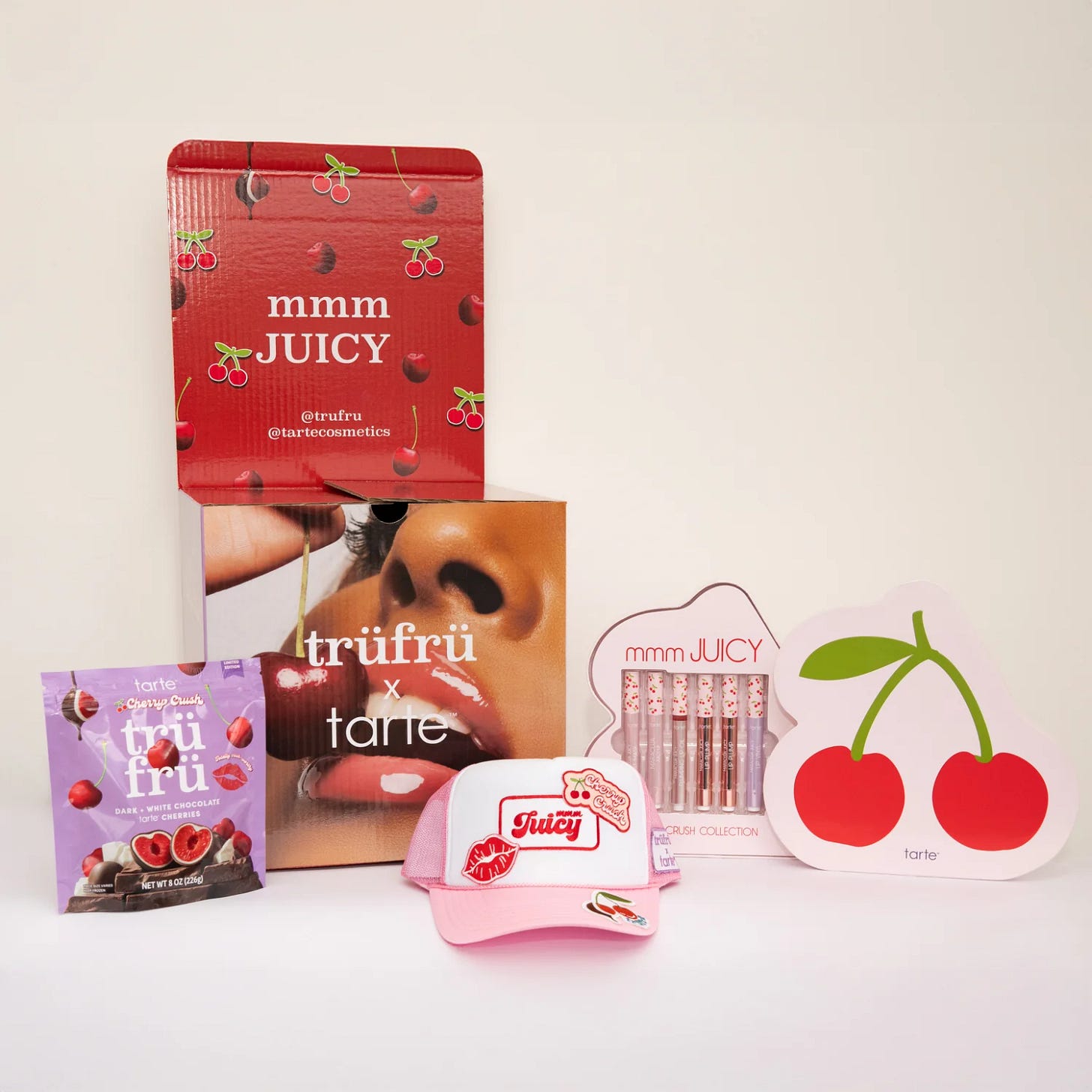
Cherries are, of course, always “trending” somewhere, but the motif is most associated with 1950s aesthetics: cherry-print hourglass dresses, a slice of cherry pie at a diner counter, Revlon’s 1953 Cherries in the Snow lipstick. The recent resurgence feels (somewhat?) (spiritually?) (in a collective unconscious sense?) related to the far-right call to “return” to a version of the decade that never existed — when men were trad and strong and women were beautiful, dutiful, pregnant. In any case, I think the “beautiful submissive girlfriend” in this futuristic, AI-infected reimagining of the ‘50s from Sam Kriss would wear TARTE TRUFRU LPS GLOP.
“Banned biological products harvested from human cells are being used in UK beauty clinics, according to experts who warn that the luxury treatments could carry serious health risks,” the Guardian reports. Exosomes, a popular ingredient in skincare products and treatments, are usually derived from plant cells or salmon testicle cells (nice), but some come “from human umbilical cord blood or other cells, which would be a breach of UK and EU regulations.”
This Glossy article about what tariffs will mean for the fragrance industry should spark some conversations about supply chains as well. “The average fragrance house may have hundreds or thousands of ingredients that are regularly restocked, that go into tens of thousands or hundreds of thousands of customer SKUs, and these ingredients can cross multiple borders before arriving in consumers’ hands,” said Alex Wiltschko, CEO and founder of fragrance research company Osmo. Those thousands of ingredients represent thousands of industries — their materials, workers, workplaces, wages, and waste — that go into the making of a single product, often with little to no oversight from the cosmetic companies that formulate with their ingredients. These murky supply chains are how L’Oreal and Estée Lauder get linked to child labor.
Here’s a more in-depth look at how tariffs are hitting the beauty industry from Beauty Independent.
And from Bloomberg: “Botox is made from one of the most toxic substances on Earth, botulinum toxin, and its purified medical recipe is a closely guarded secret. AbbVie’s Allergan unit makes Botox on the west coast of Ireland, in a town called Westport. Moving production to the US — like Trump wants companies to do — would likely be a major headache for AbbVie. (Not to mention, a potential national security issue.) The more likely scenario is that AbbVie will have to raise prices for its wildly popular drug, or eat the costs. For a drug like Botox, any increase in prices will hit patients because it’s largely used as an aesthetic treatment that isn’t covered by insurance.” I actually think this will strengthen the ultimate function of Botox (and most beauty interventions), which is cosmetic class performance.
More recommended reading:
-
“Feminist Polemic Now!” by Grace Byron for Lux Magazine
-
“Reclaim Imperfect Faces” by Sophie Gilbert for the Atlantic
-
“Trump officials quietly move to reverse bans on toxic ‘forever chemicals’” by Tom Perkins for the Guardian
Finally, I’ll leave you with eggs. By now you’ve probably heard about The Ordinary’s, shall we say, eggstra weird marketing stunt: A couple weekends ago, it sold branded cartons of “12 ordinarily priced eggs” at its stores for $3.37 as a way to 1) gesture at the famously low prices of its skincare products and 2) position its AHA 30% + BHA 2% Resurfacing + Exfoliating Peeling Solution as an essential on par with basic food necessities.
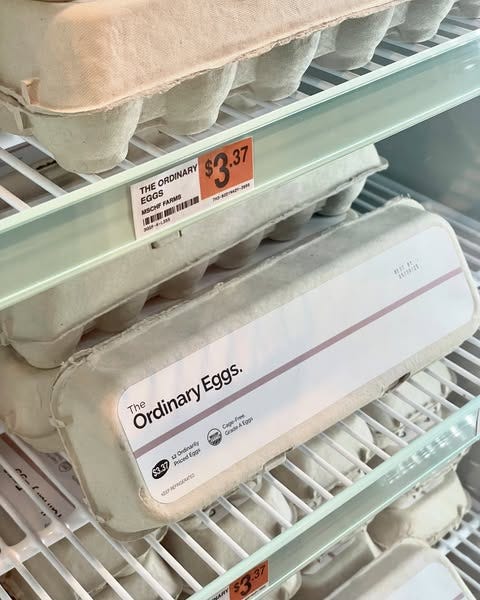
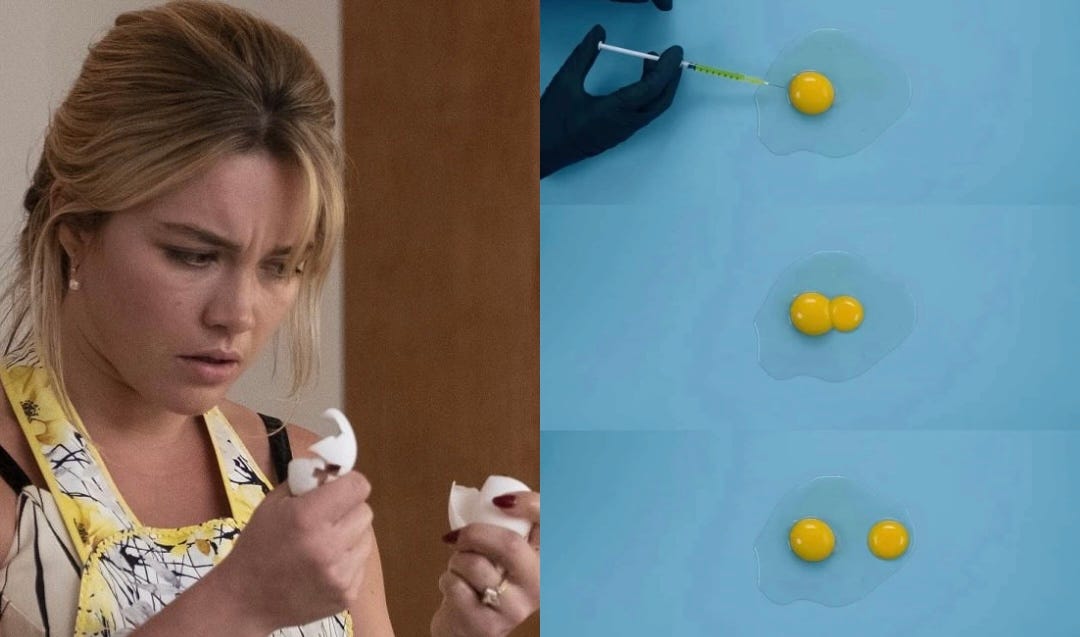
The juxtaposition of eggs, beauty, and “science” (which is The Ordinary’s core selling point) here makes me think, again, of sci-if and body horror. Films including Don’t Worry Darling, The Substance, and The Ugly Stepsister feature eggs as symbols of femininity — youthful, fertile, fragile; biological vessels that are extractable and extracted from. Science “rehatches” the female body into its most idealized form: AI-perfected in Don’t Worry Darling, younger in The Substance, thinner in The Ugly Stepsister. Some say The Ordinary’s egg campaign seems off-brand for a company that markets itself as vegan, but I say eggs make a pretty good mascot for its promise of science-driven transformation. (There’s a pun in here somewhere about peeling an egg/Peeling Solution.)
You’re Gonna Die Someday No Matter How Young You Look,
Jessica

